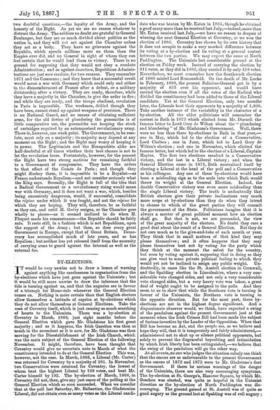two doubtful questions,—the loyalty of the Army, and the honesty
of the Right. As yet we see no reason whatever to distrust the Army. The soldiers no doubt are grateful to General Boulanger, but they are as much divided about politics as the nation is, and they will not act against the Chamber unless they act as a body. They have no grievance against the Republic, which spends millions more on them than the Empire ever did, and no General in eight of whom they can feel certain that he would lead them to victory. There is no ground for supposing that they would not obey a resolute Administration ; and as against imeutiers, Republican Adminis- trations are just now resolute, for two reasons. They remember 1871 and the Commune ; and they know that a successful revolt would mean a war with Germany which could only end either in the dismemberment of France after a defeat, or a military dictatorship after a victory. They are ready, therefore, while they have a majority in the Chamber, to give the order to fire ; and while they are ready, and the troops obedient, revolution in Paris is impossible. The workmen, drilled though they have been, cannot stand up against weapons of precision. There is no National Guard, and no means of obtaining sufficient arms, for the old device of plundering the gunsmiths is of little comparative use, the gunsmiths not keeping the stock of cartridges required by an extemporised revolutionary army. There is, however, one weak point. The Government, to be reso- lute, must rely on a majority ; its majority may depend at any moment on the Right ; and the Right may weary of keeping it in power. The Legitimists and the Bonapartists alike are half-doubtful at all times whether their best chance is not to let the revolution loose. Fortunately, however, for the present the Right have two strong motives for remaining faithful to a Government of compromise. They have the orders to that effect of the Comte de Paris ; and though they might disobey them, it is impossible to be a Royalist—as France understands Royalism—and not consider seriously what the King says. Secondly, the Right is full of the idea that a Radical Government or a revolutionary rising would mean war with Germany, and it does not want a war, which, besides being excessively dangerous, would, if successful, consolidate the regime under which it was fought, and not the regime for which they are hoping. They will, therefore, be as faithful as they can, and until M. Gr6vy resigns, or the Chamber goes wholly to pieces—as it seemed inclined to do when M. Floquet made his remonstrance—the Republic should be fairly 'safe. It rests still, in a fashion which is not Republican, upon 'the support of the Army ; but then, so does every great Government in Europe, except that of Great Britain. Demo- cracy has accomplished much of late years, and so has Royalism ; but neither has yet released itself from the necessity of carrying arms to guard against the internal as well as the external foe.























































 Previous page
Previous page